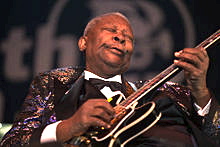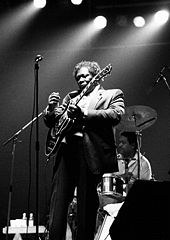B.B. King

BB King Calls This One Of His Best Performances
Get the complete 90 min concert at https://www.createspace.com/204634. This is one of the best music documentaries ever made – Live at Sing Sing Prison. Producer Harry Wiland and I filmed inside the joint. Scenes include a concert and other behind the scenes stories. This scene presents the amazing Voices of East Harlem. Other scenes involve BB King and Joan Baez, Jimmy Walker and the Voices of East Harlem and other performers.
 Riley B. King (born September 16, 1925), known by the stage name B.B. King, is an African-American blues songwriter, vocalist and guitarist.
Riley B. King (born September 16, 1925), known by the stage name B.B. King, is an African-American blues songwriter, vocalist and guitarist.
Rolling Stone magazine ranked him at No. 6 on its list of the 100 greatest guitarists of all time (previously ranked No. 3 in the 2003 edition of the same list), and he was ranked No. 17 in Gibson’s Top 50 Guitarists of All Time. According to Edward M. Komara, King “introduced a sophisticated style of soloing based on fluid string bending and shimmering vibrato that would influence virtually every electric blues guitarist that followed.” King was inducted into the Rock and Roll Hall of Fame in 1987. He is considered one of the most influential blues musicians of all time, because of this he is often nicknamed ‘The King of Blues’. He is also known for performing tirelessly throughout his musical career appearing at 250-300 concerts per year until his seventies. In 1956 it was noted that he appeared at 342 shows, and still at the age of 87 King appears at 100 shows a year.
Over the years, King has developed one of the world’s most identifiable guitar styles. He borrowed from Blind Lemon Jefferson, T-Bone Walker and others, integrating his precise and complex vocal-like string bends and his left hand vibrato, both of which have become indispensable components of rock guitarist’s vocabulary. His economy and phrasing has been a model for thousands of players, from Eric Clapton and George Harrison to Jimmy Page and Jeff Beck. King has mixed blues, jazz, swing, mainstream pop and jump into a unique sound. In King’s words, “When I sing, I play in my mind; the minute I stop singing orally, I start to sing by playing Lucille.”
Early life
King was born in a small cabin on a cotton plantation outside of Berclair, Mississippi, to Albert King and Nora Ella Farr on September 16, 1925. In 1930, when King was four years old, his father abandoned the family, and his mother married another man. Because Nora Ella was too poor to raise her son, King was raised by his maternal grandmother Elnora Farr in Kilmichael, Mississippi.
King grew up singing in the gospel choir at Elkhorn Baptist Church in Kilmichael. At the age of 12, he purchased his first guitar for $15.00, although another source indicates he was given his first guitar by Bukka White, his mother’s first cousin (King’s grandmother and White’s mother were sisters). In 1943, King left Kilmichael to work as a tractor driver and play guitar with the Famous St. John’s Quartet of Inverness, Mississippi, performing at area churches and on WGRM in Greenwood, Mississippi.
In 1946, King followed Bukka White to Memphis, Tennessee. White took him in for the next ten months. However, King shortly returned to Mississippi, where he decided to prepare himself better for the next visit, and returned to West Memphis, Arkansas, two years later in 1948. He performed on Sonny Boy Williamson’s radio program on KWEM in West Memphis, where he began to develop a local audience for his sound. King’s appearances led to steady engagements at the Sixteenth Avenue Grill in West Memphis and later to a ten-minute spot on the legendary Memphis radio station WDIA. King’s Spot became so popular, it was expanded and became the Sepia Swing Club.
Initially he worked at WDIA as a singer and disc jockey, gaining the nickname Beale Street Blues Boy, which was later shortened toBlues Boy and finally to B.B. It was there that he first met T-Bone Walker. “Once I’d heard him for the first time, I knew I’d have to have [an electric guitar] myself. ‘Had’ to have one, short of stealing!”, he said.
Career – 1949–2005
In 1949, King began recording songs under contract with Los Angeles-based RPM Records. Many of King’s early recordings were produced by Sam Phillips, who later founded Sun Records. Before his RPM contract, King had debuted on Bullet Records by issuing the single “Miss Martha King” (1949), which did not chart well. “My very first recordings [in 1949] were for a company out of Nashville called Bullet, the Bullet Record Transcription company,” King recalls. “I had horns that very first session. I had Phineas Newborn on piano; his father played drums, and his brother, Calvin, played guitar with me. I had Tuff Green on bass, Ben Branch on tenor sax, his brother, Thomas Branch, on trumpet, and a lady trombone player. The Newborn family were the house band at the famous Plantation Inn in West Memphis.”
 Performing with his famous guitar, Lucille
Performing with his famous guitar, Lucille
King assembled his own band; the B.B. King Review, under the leadership of Millard Lee. The band initially consisted of Calvin Owens and Kenneth Sands (trumpet), Lawrence Burdin (alto saxophone), George Coleman (tenor saxophone), Floyd Newman (baritone saxophone), Millard Lee (piano), George Joyner (bass) and Earl Forest and Ted Curry (drums). Onzie Horne was a trained musician elicited as an arranger to assist King with his compositions. By his own admission, he cannot play chords well and always relies on improvisation. This was followed by tours across the USA with performances in major theaters in cities such as Washington, D.C., Chicago, Los Angeles, Detroit and St. Louis, as well as numerous gigs in small clubs and juke joints of the southern US states.
In the winter of 1949, King played at a dance hall in Twist, Arkansas. In order to heat the hall, a barrel half-filled with kerosene was lit, a fairly common practice at the time. During a performance, two men began to fight, knocking over the burning barrel and sending burning fuel across the floor. The hall burst into flames, which triggered an evacuation. Once outside, King realized that he had left his guitar inside the burning building. He entered the blaze to retrieve his beloved guitar, a Gibson hollow electric. Two people died in the fire. The next day, King learned that the two men were fighting over a woman named Lucille. King named that first guitar Lucille, as well as every one he owned since that near-fatal experience, as a reminder never again to do something as stupid as run into a burning building or fight over women.
King meanwhile toured the entire “Chitlin’ circuit” and 1956 became a record-breaking year, with 342 concerts booked. The same year he founded his own record label, Blues Boys Kingdom, with headquarters at Beale Street in Memphis. There, among other projects, he produced artists such as Millard Lee and Levi Seabury.
In the 1950s, B.B. King became one of the most important names in R&B music, amassing an impressive list of hits including “3 O’Clock Blues,” “You Know I Love You,” “Woke Up This Morning,” “Please Love Me,” “When My Heart Beats like a Hammer,” “Whole Lotta Love,” “You Upset Me Baby,” “Every Day I Have the Blues“, “Sneakin’ Around,” “Ten Long Years,” “Bad Luck,” “Sweet Little Angel,” “On My Word of Honor,” and “Please Accept My Love.” In 1962, King signed to ABC-Paramount Records, which was later absorbed into MCA Records, and this hence into his current label, Geffen Records. In November 1964, King recorded the Live at the Regal album at the Regal Theater in Chicago, Illinois.
King won a Grammy Award for a tune called “The Thrill Is Gone; “his version became a hit on both the pop and R&B charts, which was rare during that time for an R&B artist. It also gained the number 183 spot in Rolling Stone magazine’s 500 Greatest Songs of All Time. He gained further visibility among rock audiences as an opening act on The Rolling Stones‘ 1969 American Tour. King’s mainstream success continued throughout the 1970s with songs like “To Know You is to Love You” and “I Like to Live the Love.”
King was inducted into the Blues Hall of Fame in 1980, and inducted into the Rock and Roll Hall of Fame in 1987. In 2004 he was awarded the international Polar Music Prize, given to artists “in recognition of exceptional achievements in the creation and advancement of music.”
 B.B. King in concert in France 1989
B.B. King in concert in France 1989
From the 1980s onward he has continued to maintain a highly visible and active career, appearing on numerous television shows and performing 300 nights a year. In 1988, King reached a new generation of fans with the single “When Love Comes to Town,” a collaborative effort between King and the Irish band U2 on their Rattle and Hum album. Also that year King played for the 1988 Republican National Convention at the behest of the notorious Republican operative Lee Atwater. King has remained friendly with the Bush Family ever since and in 1990 was awarded the Presidential Medal of the Arts by George H.W. Bush and the Medal of Freedom by George W. Bush in 2008. In 2000, King teamed up with guitarist Eric Clapton to record Riding With the King. In 1998, King appeared in The Blues Brothers 2000, playing the part of the lead singer of the Louisiana Gator Boys, along with Clapton, Dr. John, Koko Taylor and Bo Diddley.
2006–present: farewell tour and later activities
On March 29, 2006, King played at Hallam Arena in Sheffield, England. This was the first date of his United Kingdom and European farewell tour. He played this tour supported by Northern Irish guitarist Gary Moore, with whom King had previously toured and recorded, including the song “Since I Met You Baby.” The British leg of the tour ended on April 4 with a concert at Wembley Arena. And on June 28, 2009 King returned to Wembley arena to end a tour around Great Britain with British blues icon John Mayall. When questioned as to why he was embarking on another tour after already completing his farewell stint, King jokingly remarked that he had never actually said the farewell tour would be his last.
In July King went back to Europe, playing twice (July 2 and 3) in the 40th edition of the Montreux Jazz Festival and also in Zürich at the Blues at Sunset on July 14. During his show in Montreux at the Stravinski Hall he jammed with Joe Sample, Randy Crawford,David Sanborn, Gladys Knight, Lella James, Earl Thomas, Stanley Clarke, John McLaughlin, Barbara Hendricks and George Duke. The European leg of the Farewell Tour ended in Luxembourg on September 19, 2006, at the D’Coque Arena (support act: Todd Sharpville).
In November and December, King played six times in Brazil. During a press conference on November 29 in São Paulo, a journalist asked King if that would be the actual farewell tour. He answered: “One of my favorite actors is a man from Scotland named Sean Connery. Most of you know him as James Bond, 007. He made a movie called Never Say Never Again.”
In June 2006, King was present at a memorial of his first radio broadcast at the Three Deuces Building in Greenwood, Mississippi, where an official marker of the Mississippi Blues Trail was erected. The same month, a groundbreaking was held for a new museum, dedicated to King. in Indianola, Mississippi. The B.B. King Museum and Delta Interpretive Center opened on September 13, 2008.

